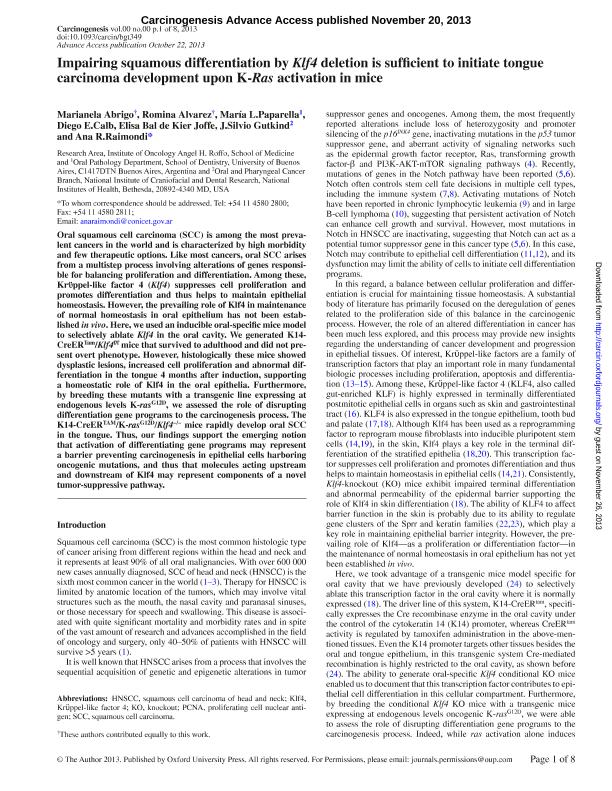Artículo
Impairing squamous differentiation by Klf4 deletion is sufficient to initiate tongue carcinoma development upon K-Ras activation in mice
Abrigo, Marianela; Alvarez, Romina Soledad ; Paparella, María Luisa; Calb, Diego E.; Bal, Elisa Dora
; Paparella, María Luisa; Calb, Diego E.; Bal, Elisa Dora ; Gutkind, J. Silvio; Raimondi, Ana Rosa
; Gutkind, J. Silvio; Raimondi, Ana Rosa
 ; Paparella, María Luisa; Calb, Diego E.; Bal, Elisa Dora
; Paparella, María Luisa; Calb, Diego E.; Bal, Elisa Dora ; Gutkind, J. Silvio; Raimondi, Ana Rosa
; Gutkind, J. Silvio; Raimondi, Ana Rosa
Fecha de publicación:
10/2013
Editorial:
Oxford University Press
Revista:
Carcinogenesis
ISSN:
0143-3334
Idioma:
Inglés
Tipo de recurso:
Artículo publicado
Clasificación temática:
Resumen
Oral squamous cell carcinoma (SCC) is among the most prevalent cancers in the world and is characterized by high morbidity and few therapeutic options. Like most cancers, oral SCC arises from a multistep process involving alterations of genes responsible for balancing proliferation and differentiation. Among these, Krupsilonppel-like factor 4 (Klf4) suppresses cell proliferation and promotes differentiation and thus helps to maintain epithelial homeostasis. However, the prevailing role of Klf4 in maintenance of normal homeostasis in oral epithelium has not been established in vivo. Here, we used an inducible oral-specific mice model to selectively ablate Klf4 in the oral cavity. We generated K14-CreERTam/Klf4 f/f mice that survived to adulthood and did not present overt phenotype. However, histologically these mice showed dysplastic lesions, increased cell proliferation and abnormal differentiation in the tongue 4 months after induction, supporting a homeostatic role of Klf4 in the oral epithelia. Furthermore, by breeding these mutants with a transgenic line expressing at endogenous levels K-ras G12D, we assessed the role of disrupting differentiation gene programs to the carcinogenesis process. The K14-CreERTAM/K-ras G12D/Klf4 - /- mice rapidly develop oral SCC in the tongue. Thus, our findings support the emerging notion that activation of differentiating gene programs may represent a barrier preventing carcinogenesis in epithelial cells harboring oncogenic mutations, and thus that molecules acting upstream and downstream of Klf4 may represent components of a novel tumor-suppressive pathway.
Palabras clave:
Oral Cancer
,
Mutated Ras
,
Klf4
,
Transgenic Mice
Archivos asociados
Licencia
Identificadores
Colecciones
Articulos(OCA HOUSSAY)
Articulos de OFICINA DE COORDINACION ADMINISTRATIVA HOUSSAY
Articulos de OFICINA DE COORDINACION ADMINISTRATIVA HOUSSAY
Citación
Abrigo, Marianela; Alvarez, Romina Soledad; Paparella, María Luisa; Calb, Diego E.; Bal, Elisa Dora; et al.; Impairing squamous differentiation by Klf4 deletion is sufficient to initiate tongue carcinoma development upon K-Ras activation in mice; Oxford University Press; Carcinogenesis; 35; 3; 10-2013; 662-669
Compartir
Altmétricas



